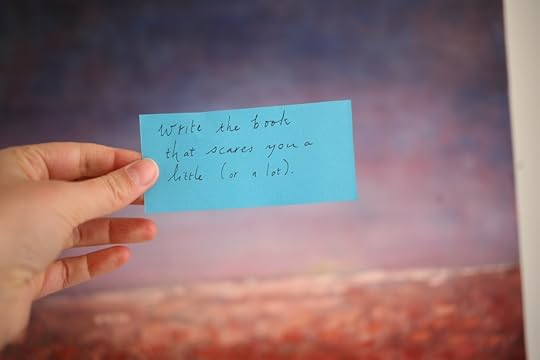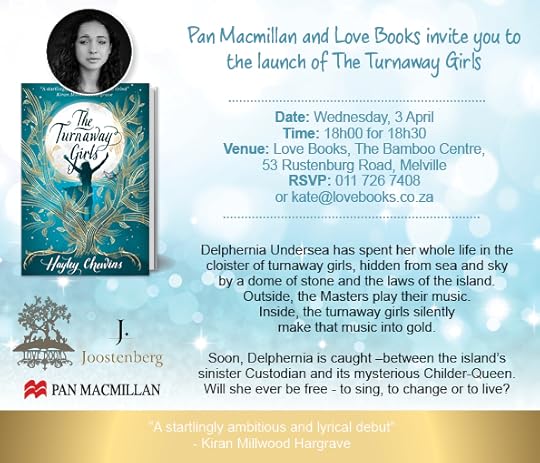Hayley Chewins's Blog, page 3
October 29, 2019
are you copying your favourite artists?

“Where do you get your inspiration?” When people ask me this, I usually say something like, “From everything! Paintings I love, and music that moves me, and books I’ve read…”Usually I get a nod and a smile in response, but the other day, at the gym, something more interesting happened. Someone asked, “But how do you make sure you’re not being subliminally influenced by the things that inspire you?”In other words: “How do you make sure you’re not inadvertently copying someone else’s work?”The fear of copying another artist is really fascinating to me, because I think it’s a fear that starts at school.At school, more often than not, we are told not to copy one another. There is an intense spirit of competition and comparison. We are seated in rows, at desks. We are told to hide our work from the students next to us. It’s no wonder that, well into adulthood, we still find ourselves concerned about copying.But art doesn’t work that way.Imagine two writers who are seated facing a window, looking out at the sea, or at a beautiful garden. If you were to ask them to write a story inspired by the view, would they write the same story, word for word? Of course not. Why? Because, although they might be looking at the same trees or the same ocean, they are not seeing the same thing. We all see the world through the lens of our experiences and fascinations, our pain and trauma, our memories and joys. No two writers ever see the same tree, just as no two writers ever read the same book, or look at the same painting.Now, imagine that the thing the writers are “seeing” is something as complex, layered and intricate as Laini Taylor’s Strange the Dreamer, or Van Gogh’s Sunflowers, or The Trial by Franz Kafka. So, I assure you, unless you are going out of your way to do so, you will never write the same book as someone else. The source material might be the same, but the difference is you—your view, your heart, your mind. The truth is, if you have the courage to look through your own eyes at the world around you, you are already a complete and utter original. Own that.(Caveat: I’m not talking about obvious plagiarism. i.e., lifting exact phrases, sentences or ideas from another person’s work. There is no excuse for that.)
October 28, 2019
productively unproductive

For the past two weeks, I’ve been feeling strange.I want to dip in and out of books instead of powering through them at my usual speed. I want to read about random topics—language adaptation or conscious parenting—for no real reason. I want to write without direction in my notebooks and look up odd words in the dictionary. I want to wander.And I feel guilty for it.The thing is, I want to be productive. I want to feel that I’m charging ahead on the various books that I’m writing. I want to be decisive, to tick things off lists, to achieve.And yet, this feeling lingers. The desire to go for long, meandering drives, or to walk in the park with my dog, to listen to the rustling of leaves overhead.If this were five years ago, I’d be thinking about resistance. I’d be worrying that I was putting off productivity because of fear and self-sabotage. But now that I’m a little older and a little wiser, I know that all I need is a little rest. It’s not that I need physical rest. It’s not that my mind is burnt out. I don’t want to sleep or lie on the sofa, watching reruns of Gilmore Girls. What I want is a rest—a respite—from routine and from structure. I want to play. I want to follow my curiosity. I want to listen to my intuition instead of my rational mind. I want just a little bit of freedom. I want to wander.So I’m letting myself. I’m letting my mind potter about for the next day or two. I know I’m not lazy. I know I’m not afraid, or sabotaging my work. I know it’s just a desire of the soul to do what it wants to do for a little while, and I’m going to let it.Because I know that giving myself this time and space—this emptiness—is the most productive thing I can do for my writing, I plan to be gloriously unproductive.
October 25, 2019
my new favourite writing exercise

Yesterday I was listening to an interview with Sarah Selecky, author of This Cake is for the Party and Radiant Shimmering Light. Sarah runs the Sarah Selecky Writing School and she has a lot of really wise things to say about craft and creativity.Anyway, she mentioned an exercise that struck me as interesting. Basically, you set a timer for five minutes, choose a letter of the alphabet, and write a list of words that start with that letter until the timer goes off. This intrigued me immediately, mainly because I couldn’t see the point of it. A list of words starting with a chosen letter? For five minutes? What would that do? Of course this meant I had to try it.So, this morning, I got up early, made coffee, and sat at my desk. I opened up a notebook and rummaged around for a pen. I set a timer on my phone for five minutes. I chose the letter H, and I wrote my list.And something magical happened.In fact, I enjoyed this exercise so much that, when it was over, I set another timer, chose another letter (L) and did it again. So what’s going on here? What is the point of writing a list of words for five minutes without stringing them into sentences or using them to brainstorm a plot or “figure out” a character? The productive, career-focused, over-achieving writer in me was going, “This is so useless! This is senseless!” But it wasn’t useless or senseless at all. It was magic.And here’s why. Part of what makes this exercise so delicious is that it’s utterly pointless. I actually think I have far too little pointlessness in my life. I needed it. Because my brain filed this exercise away as silly and unimportant, there was absolutely no pressure to write a good list, or a fascinating list, or a beautiful list, or a life-changing list. I was not going to send this list off to anyone to ask if it should be published. It didn’t matter if was good or not. It was just a list. And then there’s the act of writing words, in ink, on a page. It felt good. It felt like a nice stretch, or brewing coffee first thing in the morning, or spreading butter on perfectly golden toast—it had the air of those small, everyday pleasures.A pleasure. That’s what it was.Sometimes I would think of a word I loved so much (halcyon) that I would get shivers. Sometimes I would write a word that was pretty ordinary (say, hook) and notice, for the first time, its energy and sharpness.Other times, a word would feel silly to me—a word like hop. I’d think, for a moment, that it was absurd to have halcyon and hop sitting side by side. But after a second I’d correct myself: this is the beauty of language. Hop has a feeling to it that halcyon doesn’t. There is no hierarchy.So what’s the point of this exercise? It alerts you to the fact that each word has its own texture, its own angles, its own feel and history and sound.It reminds you how much you love words, reminds you of their delight and power, reminds you that you loved them first, before you loved being published and getting marvellous reviews.In short, it reminds you why you write in the first place.I highly recommend it. (Thanks, Sarah.)If you want to find out more about Sarah’s writing school or read her insightful blog, click here.(I don’t know Sarah personally, and I’m not getting paid to say this. I just really like her work.)
October 24, 2019
do stories matter?

A little while ago, I received a response to my monthly newsletter that troubled me. Without greeting or introduction, a question was posed: “Why is writing fiction worth it? Why do stories really matter?” I didn’t respond. How was I supposed to answer that question? A question that has, arguably, never been answered in any concrete way? I felt overwhelmed by it, and, to be honest, the tone of the question seemed more provocative than anything else. But the thing is, in my own, small way, I do know the answer to this question, and that’s why I wanted to write something about it here. I, for instance, know that when I was living in Bath, away from my family, feeling loneliness like a physical ache, I clung to a novel called A Tale for the Time Being by Ruth Ozeki as though it were a literal life raft. I felt, when I was reading it, like I could exchange some of my sadness for the sadness of the narrators. It gave me a break from my depression and helped me to process it.I know, too, that when I was studying law and wrestling with whether or not I actually wanted to be a lawyer, I was moved to tears when I encountered Yeats’s The Lake Isle of Innisfree. The final stanza, in particular, struck me, as though it’d been written for me personally:I will arise and go now, for always night and dayI hear lake water lapping with low sounds by theshore;While I stand on the roadway, or on the pavementsgrey,I hear it in the deep heart’s core.I felt as though these lines had been written for me personally because I was wrestling with my own “deep heart’s core”—with what it was saying to me, and what I was going to do about it. I know that I probably enjoyed The Confession by Jessie Burton as much as I did—seriously, it’s wonderful—partly because of how it addresses ideas about motherhood and female agency and because I’m thirty-one now and every second person I meet asks me whether I’m going to have a child in the near future. I know that I have sobbed when I’ve finished books—A Gentleman in Moscow comes to mind—not because the endings are sad but because I cannot bear to leave the characters behind. I know that I have laughed and cried along with entirely fictional people.I have buried myself in a Polish bog to hide from murderers (Fugitive Pieces by Anne Michaels) and I have imagined my soul as an animal and taken it into in my arms (His Dark Materials by Philip Pullman). I have whole feelings that were only ever given names by poems. (See: Sylvia Plath.)Just yesterday, I reread “Waiting” by Yevgeny Yevtushenko (translated into English by Robin Milner-Gulland and Peter Levi) and was reminded, vividly, of how desperately I missed my husband when I lived apart from him for a year. It flooded me with a sort of world-tilting gratitude.Do stories “teach” us anything? Does fiction “educate”? I’m not sure if it does. Stories are, by nature, not arguments. They are experiences. Part of the reason why it’s so difficult to say why fiction is valuable and important (as valuable and important as, say, penicillin or bridges) is that they’re so hard to pin down. What do we use them for? We don’t really know their nature, just as we don’t really know ours. But there, precisely, is why we need them: stories are as complicated as we are. Poems, thank goodness, do not ever only mean one thing.So I suppose it’s going to have to be enough to say, in response to the question posed, that stories, poems and novels have been immensely “worth it” to me. They have protected me and challenged me. They have shown me to myself while also reminding me that what I see is only a tiny glimpse, one fraction, of a complex, ever-shifting whole.Yes, stories really, really matter. They matter a great deal.If you’re reading this, I’d love to hear your thoughts. Do you think fiction is worth it? Why do stories really matter to you? Leave a comment and let me know.
October 23, 2019
how alain de botton has changed how I think about life--and writing

Here is a small but nonetheless profound thing that has happened in my life in the past month or so: the work of Alain de Botton has altered my perspective forever.
I’ve started thinking about my life differently. Which of course means that I’ve started thinking about my writing differently, too.
I’ve realised that I’ve been lugging around the sincere and rather burdensome idea that I have to be exceptional in order to be worthy of a place on Earth. (Even as I type this, I’m thinking, Of course I want to be exceptional! Doesn’t everyone??)
The truth is, I still want to be exceptional. Desperately. And this is not necessarily a bad thing.
Having the belief that being exceptional = being loved and valued usually means you put effort into everything you take on. You strive to do excellent work. You think about your actions, your choices, your trajectory.
These are all good things.
Except, of course, when they’re not. Except when they stop you from working in the first place because the inner pressure to work well, to work perfectly, is so overwhelming. Except when, for whatever reason, you fail to be exceptional at something, and consequently feel that the world is ending. Ending.
Except then.
I particularly love de Botton’s work because of its gentleness and balance. And I’ve found that, as I’ve absorbed it, I’ve also absorbed some of its tone. Its calm.
I’m learning to rest in the belief that, actually, what you need to do in order to qualify for a place on Earth is exist. The breath in your lungs is enough. And, while it’s wonderful to strive to be the best at something, that is not all there is.
Sometimes there is only breath, only one word after the other and all the uncertainty that brings.
Sometimes there is only what we have now—and now, and now, and now.
And maybe your job isn’t to be the best at something.
Maybe your job is simply to be you.
If you like posts like this, you might like my newsletter, which you can sign up for here.
August 4, 2019
how to keep writing when you feel like giving up

“Everyone has a novel in them.” Well, maybe. But if that’s true, then so is this: not everyone has the grit to write a novel. Just like, technically, anyone could complete a marathon if they wanted to. But most people won’t, because they don’t have the commitment to train for a run like that. (Including me!)My point is, the difference between someone who actually writes the novel they want to write and someone who doesn’t is simply this: the person who got to the end didn’t quit. That’s it. And it’s kind of freeing, really. It’s not about talent, or having a great idea, or being blessed from above by some scriptorial muse. Whether or not you write your novel is entirely up to you. That’s empowering. That means you get to decide. If you’re ready to write your book all the way to the end, here are some tips for not giving up:Have a road mapLook, I get that some people love to outline and some people hate it. But having some sort of road map going in really helps, even just to create the illusion that you know where the story is going. (Even if you just know the event that’s going to get the story rolling and the event in the middle that’s going to change everything—like I usually do.) Caveat: if you’re anything like me, your outline will change as you go. That’s okay. You can always go back to outlining or brainstorming if you get stuck. Which brings to me to…Plan for getting stuckEven if you outline extensively, you will probably get stuck, because everyone gets stuck. Sometimes what you write in an outline doesn’t make sense once it’s in a story, or something magical happens in your draft (yay!) that changes everything (argh!). The trick here is not to panic. Like I said, it happens to pretty much everyone. If/when you get stuck, here are some things you can do: Stop writing for an hour or a day and do something else. Go for a walk or swim in the sea. Talk to people. Stop thinking about the problem and let your subconscious figure it out. Take a more active approach and brainstorm the problem out. Put your favourite music on, or go to your favourite coffee shop, and write yourself through the problem. Draw diagrams. Write lists. Ask yourself questions and answer them. Find connection points.Know that you are going to feel like giving up…and that feeling like giving up does not = giving upRead interviews with writers and you’ll see a common thread: every writer feels like giving up sometimes. When you feel like giving up, notice it, recognise it, be kind to yourself. Take a break if you need to. But don’t wait too long before you get back to work. Just recognise the uncomfortable feeling and keep going. Get an accountability partnerFind a critique partner and plan to exchange chapters with them. Tell a friend you’re writing a book and you’re going to send it to them on X date. Join a class, or do NaNoWriMo. Writing a novel can be a lonely experience, and having an external deadline of some kind changes everything. If you’re wondering where to find a critique partner, try Twitter, your local SCBWI chapter, Ladies Who Critique, or google “critique partner [your genre]” to find match ups. Just decide that this time, things are going to be differentLife is short. If you want to write a book, then write your book. You are the only one who can decide whether you’re going to do it or not. So just decide. Start today. Take it one day at a time. And keep going. It really is that simple. Now you tell me: what do you do when you feel like giving up? Let me know in the comments and let’s encourage each other. Love,Hayley
June 23, 2019
5 writing prompts that’ll get you excited about writing again

Feeling stuck?Prompts work because they impose limitations on your writing, which focuses your attention and helps you to think creatively.I love these weird writing prompts and I hope you’ll love them, too. These were all made up by moi—feel free to take what works for you and leave the rest, or tweak them however you like! Okay, here we go!Choose a scene from your favourite movie and rewrite it from the perspective of an object in the room. Write a scene from the perspective of the colour red. Write a scene about the sea without describing how it smells, sounds or looks. Write a scene about a party that has these three things in it: a walking stick, the smell of cinnamon, and a crying baby. Write a scene in which two characters have a fight, but no one speaks.Write a scene about a picnic that is only dialogue. Let me know which prompt is your favourite in the comments. I’d love to know if any of these helped you!Happy writing!Love,Hayley
June 9, 2019
how to submit your manuscript and look professional doing it

Want to send your work out but don’t know how? Here are some tips for sending your poem/story/manuscript to agents and editors and looking like a professional doing it. DO YOUR RESEARCHIf you’re submitting your poems or story to a journal, read past issues. If you’re submitting to a small press, read the books they publish. If you know the kind of thing they usually publish, you’ll know if your poem or story is a good fit for them. If it’s not a good fit, don’t submit to them. Find people who like the stuff you’re making. If you’re querying your manuscript, make sure the agents you’re submitting to actually like and want to represent the kind of thing you’ve written. I know this seems basic, but you’d be surprised at how many people don’t do this.FOLLOW THE GUIDELINESEvery agent/journal/publisher has different submission guidelines. Read the guidelines and follow them. I promise you, if you do this, you’re already setting your submission apart. BE KIND Do not respond to a rejection by insulting the person who sent it to you. Rejection is not personal, and agents and editors aren’t trying to ruin your life. Take it, and move on.Say something like, “Thank you for considering my work.” Agents and editors read submissions over and above working hours. They’re spending their time reading your words. They’re doing their best. Do yours. MAKE SURE YOUR WORK IS READYOnly submit work you’re really, really proud of. My recommendation is to do a first draft, let it sit for a little while, then read it again and do your own revisions. Send the second or third draft to critique partners, do more changes, and then maybe you’ll be ready to submit.BE PATIENTEditors and agents have many, many submissions to get through. Be patient. Don’t nudge them incessantly. Don’t refresh your inbox obsessively. Instead, get to work on the next thing you’re going to send out. That’s where the gold is. Were these tips helpful? Is there anything I left out? Let me know in the comments! Happy writing and happy submitting :)
March 30, 2019
THE TURNAWAY GIRLS South African Book Launch!

If you’re in South Africa, I’ll be launching THE TURNAWAY GIRLS at Love Books in Melville, Johannesburg. There will be wine and food and I’ll be chatting to the brilliant Alison Lowry about all things writing/children’s books/international publishing/fantasy/fairy tales. I hope to see you there!Love,Hayley
August 31, 2018
how to write three books at the same time

For whatever reason—the start of spring, the nearing release of my debut novel, the fast approach of my thirtieth birthday—I have decided that September will be the month of writing all the books.Three books, exactly.One polished draft and two rough drafts. I’ve never done this before. I’ve always thought of myself as a one-project-at-a-time sort of writer. But if there’s anything I’ve learnt about writing (and life) it’s this: never assume anything you know about yourself is unchangeable. You can change anything if you really want to.In preparation for my month of writing all the books, I have spent the last week of August acting like it’s a perfectly natural thing for me to be writing three projects at the same time. Would you like to know how I’ve made it work? Here are some things I have learnt in past seven days:Make sure the projects are fairly different from one another (in some way)One of things that’s made my week of crazy writing manageable is that the projects I’ve chosen to work on are all pretty different. One is YA, one is upper MG, and one is lower MG. So even though they’re all weird and magical, they’re distinct in my mind because they’re for different age categories. (If you write multiple genres, that could work, too.)Assign a physical space/object to each projectThis really helps me to compartmentalise. I’ve been working on the YA weird book on my sofa, using a pencil and notebook. I’ve only been looking at my upper MG fantasy at my desk, using my laptop, and I work on the lower MG fantasy on my laptop/in a notebook with pen, at the table in my dining room. Somehow I have tricked my brain into moving between projects by changing my position in space. (Yay, brain!)It helps if the projects are at different stagesMy upper MG book is in the editing/polishing stage, my YA book is in the drafting stage, and my lower MG book is in the outlining stage. This also helps my brain to see them as separate, instead of congealing them into one big glob of a book.It’s easier to write short(er) books this wayI write books that are on the short side. Even the YA book I’m drafting is never going to be 80 000 words long. So. That’s not a tip, just an observation. If you’re writing 100 000-word books, maybe don’t do this? (Or, if you can do this, tell me and I will bow down to you, you writing genius.) For reference, my upper MG fairy tale/fantasy is about 40 000 words, the lower MG will be about 25 000 words. (Or it might be closer to 30 000 or 40 000. We’ll see?) And the YA—well, I’m actually writing it in verse at the moment so I’m aiming for 25 000 – 30 000 words. As you can see, we’re not dealing with huge word counts here.They don’t have to be different genres, but it helps if they have different tonesEven though all of these books are dark, fairy-tale-style fantasies, they have very different settings, moods and colour palettes. If I were more visually inclined, I might make an aesthetics board for each of them to keep them separate in my mind, but since I’m not really that sort of writer, I just make sure I know how each of the worlds feels to me, and I try not to let them overlap. Each world has markers (climate, a species of magical animal, a city I’m basing the world on) and I try to keep them pretty distinct.Music helps!I’ve chosen one song for each project that I listen to on repeat. (I don’t always listen to music, though. Sometimes I need silence.) I find that if I’m struggling to enter the world of a book, a song can be a good door.Set small goalsI’ve made my goals for each project really small so that I don’t get overwhelmed. “Small” is a relative term, depending on so many factors, so I’m not going to say what the actual word counts are, but just make sure your goals aren't so ambitious that you get overwhelmed. You want to be able to dip into each project a little every day (if you write every day, that is). Find what works for you.Like I said, I’ve only been doing this for a week, so I might fail!And that’s all right. I’m treating it as an experiment for now. But it’s been a pretty successful one so far!How about you? Do you write multiple books at the same time, or do you focus on one project? I’d love to hear your thoughts in the comments!Happy writing!



